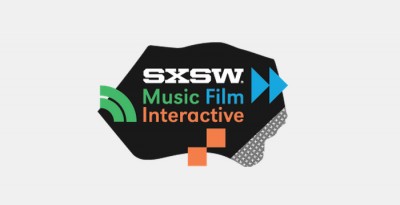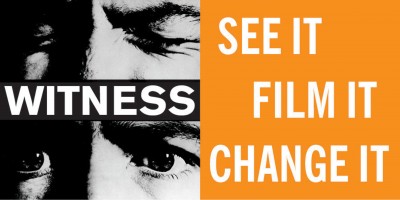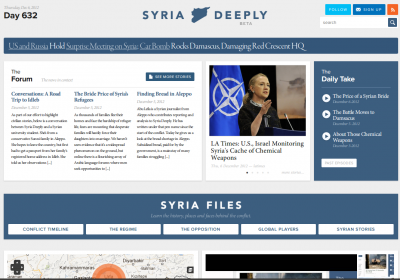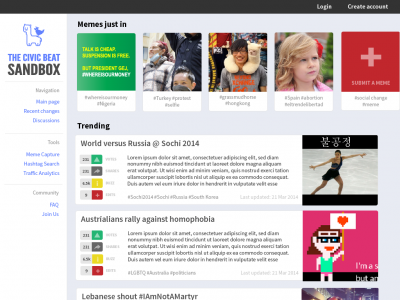Spending a week in Austin, TX for my first SXSW conference was exciting, but the opportunity to be a panelist discussing social change memes around the world alongside accomplished scholars and researchers was thrilling. Our panel, The LOLs of Nations: Understanding Global Memes, was a great success, and a recap of the panel with the slides is on its way! After a week of standing in line and running to see as many panels, films, and concerts as humanly possible, I am exhausted. As I settle back into Oakland, I finally have the opportunity to catch my breath and get a full night’s rest, yet my mind is reflecting and reeling over the experience.
The greatest thing about SXSW was the chance to meet a few people face to face that I had only followed online. Hearing fascinating talks, the latest projects, and discussing everything from LulzSec to verification of citizen journalism over delicious tacos was by far the most rewarding part of SXSW. Here are some questions and themes that stood out and resonated with me:
-
What do we (publishers, activists, nonprofits) owe our online communities which we increasingly rely on, especially in citizen journalism?
Josh Stearns, (@Jcstearns) of Free Press hammered this dilemma home to me in one on one conversation and on the panel he moderated, Hacking Attention: Media, Technology & Crisis; it will be something I grapple with for some time. Stearns pointed to the dire situation of dwindling funds in traditional journalism, and a growing reliance on citizen journalists, how can news organizations provide all of these citizen journalists protection from arrest, kidnapping, and dangerous situations they are in?
-
What is the distinction between an accidental citizen journalist and a committed one and how do we treat both as external news agencies or organizations?
This is largely a policy issue which I think we are universally dropping the ball on. News and advocacy organizations need to demand legal protection of citizen journalists offering important news and offer real legal protection to those they rely on.
One great example of a successful tactic came from Madeleine Bair (@madbair) of WITNESS, a non-profit dedicated to empowering, “people to transform personal stories of abuse into powerful tools for justice, promoting public engagement and policy change.” Bair recounted how WITNESS had tried to make an entirely new platform dedicated to activists, but after some trial and error, decided to work instead with YouTube. WITNESS benefited from YouTube’s technology, accessibility, existing network, and worked with YouTube to help protect the identities of those depicted in important videos around the world. This struck me as an extremely important case study, and one I hope to see further researched and replicated across other platforms.
Fascinating discussion about social newsgathering #ethics at #SXSW #UGCethics pic.twitter.com/jMLumR7t20
— Joleen Ong (@joleendearest) March 9, 2014
-
The importance of accuracy in social journalism.
In order to build trust, organizations dedicated to sharing and using social content need to place a stronger emphasis on the need for accuracy. Although sharing content and asking your community to validate is a useful tactic, ultimately slowing down and doing due diligence is worth it. So while much of the power and fun of social media comes from the unrestricted flow of information, news organizations have an obligation to carefully curate and elevate only the best; no easy task, but worth your community’s trust. Eric Carvin, (@EricCarvin), Social Media Editor at the Associated Press spoke at length about the first thing he does after getting a tip or incite from social media was call the person and ask them about it. Carvin emphasized that not only did this help to validate the information, he often got even more context than the original posts. A win-win for him.
-
How can you elevate stories for social change in a ubiquitous media environment?
Matt Stempeck (@mstem) formerly of MIT Media Lab and Adaora Udoji (@AdaoraUdoji) of Syria Deeply, an online publication, discussed the importance of reaching existing communities, instead of building a community from scratch. When there is so much to read, finding those who already care about your mission is the most important start. Bair says that WITNESS focuses on reaching the right audience by focusing on matching videos of abuses to the local lawyers and politicians most able to actually do something. Udoji contrasted their models with Upworthy, which seems to want everyone to care about all things – an increasingly less effective model for advocacy as more platforms continue to emerge.
Ultimately much of the panels at SXSW that were most meaningful were about how to build more robust infrastructures, policies, and best practices around elevating and enacting the positive potentials of new technologies and social media. I look forward to staying in touch with these innovative panelists, and look forward to opportunities to collaborate more in the future.
Already, our Knight Foundation News Challenge proposal was influenced by many of the conversations I had at SXSW. Recognizing how international news organizations have traditionally offered poor contextualization and representation of local events, our wiki seeks to engage the local voices directly. We want to document existing conversations, and help draw important parallels. Documenting these emerging practices and web vernacular is invaluable for activists, non-profits, and netizens around the world seeking a more impactful voice.
Although I had to miss many great panels, here are some of my favorites. I highly recommend you visit the SXSW web site and look for the following panel discussions. Audio should be posted for archival purposes.








